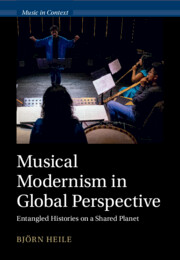Book contents
- Musical Modernism in Global Perspective
- Music in Context
- Musical Modernism in Global Perspective
- Copyright page
- Contents
- Tables
- Examples
- Supplementary Material
- Acknowledgements
- Note on the Text
- Introduction
- Part I Rethinking the Historiography of Musical Modernism
- 1 Echoes of The Rite in Latin-American Music and Literature
- 2 Exile, Migration and Mobility
- 3 Institutionalised Internationalism
- Part II Two Case Studies
- Bibliography
- Index
3 - Institutionalised Internationalism
The International Society for Contemporary Music
from Part I - Rethinking the Historiography of Musical Modernism
Published online by Cambridge University Press: 23 May 2024
- Musical Modernism in Global Perspective
- Music in Context
- Musical Modernism in Global Perspective
- Copyright page
- Contents
- Tables
- Examples
- Supplementary Material
- Acknowledgements
- Note on the Text
- Introduction
- Part I Rethinking the Historiography of Musical Modernism
- 1 Echoes of The Rite in Latin-American Music and Literature
- 2 Exile, Migration and Mobility
- 3 Institutionalised Internationalism
- Part II Two Case Studies
- Bibliography
- Index
Summary
Existing research on the ISCM tends to focus on the ‘centres’ in Western and Central Europe and North America. Although the membership included countries in Latin America and Asia from early on – for instance, Argentina joined in 1924, and Japan in 1935 – and eventually in Africa (South Africa, 1948), much less attention has been paid to the role the ISCM played in these regions. As this chapter argues, it is in the ‘peripheries’ that the ISCM proved particularly influential in stimulating diverse conceptions of musical modernism within specific local contexts. However, the significance of the ISCM for its far-flung members was rarely reciprocated. The ISCM’s inflexible structure and flawed conception of internationalism, founded on the unquestioned sovereignty of the nation state, perpetuated the imbalances between centre and periphery. Using quantitative data on national and regional representation at various levels, complemented by qualitative data, such as interviews with key players and archival records, I formulate a critique of the ISCM as an institution that struggled to overcome the systemic Eurocentrism of its foundation.
Keywords
- Type
- Chapter
- Information
- Musical Modernism in Global PerspectiveEntangled Histories on a Shared Planet, pp. 107 - 150Publisher: Cambridge University PressPrint publication year: 2024

